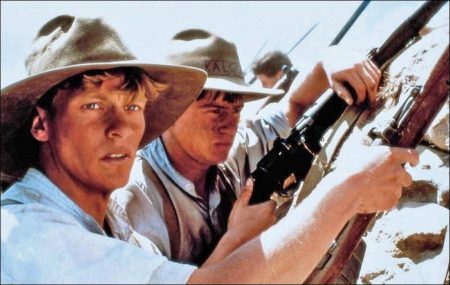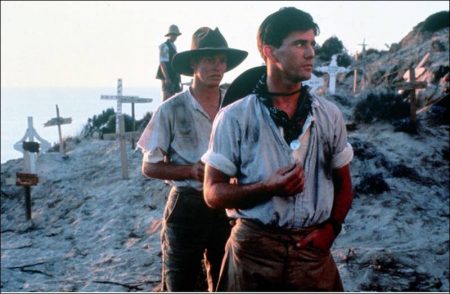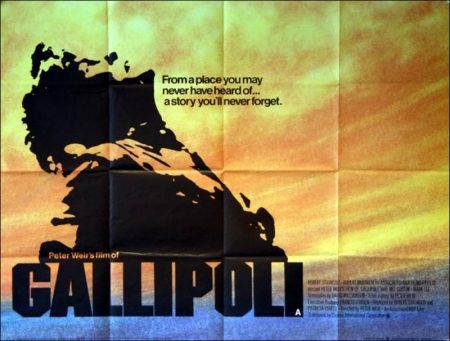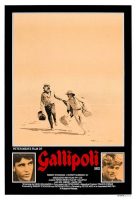Taglines: From a place you’ve never heard of, comes a story you’ll never forget.
Gallipoli movie storyline. World War I, 1915. Archy Hamilton (Mark Lee), a rising-star sprinter, sets aside his dreams to join the Australian Light Horse Division to fight in the war. He runs into fellow sprinter Frank Dunne (Mel Gibson), whom he convinces to join up with him. Unable to enter the Light Horse due to his inability to ride a horse, Frank is sent to Infantry, where he encounters some old buddies. Training commences, and Frank and Archy run into each other. With a special transfer to the Light Horse, Frank and Archy are sent to the Gallipoli Peninsula to fight the Turks. What they encounter shakes their beliefs about war. Can they survive the massacre?
Gallipoli is a 1981 Australian war drama film directed by Peter Weir and produced by Patricia Lovell and Robert Stigwood, starring Mel Gibson and Mark Lee, about several young men from rural Western Australia who enlist in the Australian Army during the First World War. They are sent to the peninsula of Gallipoli in the Ottoman Empire (in modern-day Turkey), where they take part in the Gallipoli Campaign.
During the course of the movie, the young men slowly lose their innocence about the purpose of war. The climax of the movie occurs on the Anzac battlefield at Gallipoli and depicts the futile attack at the Battle of the Nek on 7 August 1915. It modifies events for dramatic purposes and contains a number of significant historical inaccuracies.
Gallipoli provides a faithful portrayal of life in Australia in the 1910s—reminiscent of Weir’s 1975 film Picnic at Hanging Rock set in 1900—and captures the ideals and character of the Australians who joined up to fight, as well as the conditions they endured on the battlefield, although its portrayal of British forces has been criticised as inaccurate.
It followed the Australian New Wave war film Breaker Morant (1980) and preceded the 5-part TV series ANZACs (1985), and The Lighthorsemen (1987). Recurring themes of these films include the Australian identity, such as mateship and larrikinism, the loss of innocence in war, and the continued coming of age of the Australian nation and its soldiers (later called the ANZAC spirit).
It won eight AFI Awards, including Best Film, Best Director, Best Actor, Best Supporting Actor, Best Screenplay and Best Cinematography.
Themes and Production
A major theme of this film is loss of innocence and the coming of age of the Australian soldiers and of their country. An early scene in the film shows Uncle Jack reading from Rudyard Kipling’s The Jungle Book about how Mowgli has reached manhood and now must leave the family of wolves that raised him. Actor Mel Gibson commented, “Gallipoli was the birth of a nation. It was the shattering of a dream for Australia. They had banded together to fight the Hun and died by the thousands in a dirty little trench war.” In an examination of Gallipoli’s enduring legacy, SBS Movies notes “The soldiers of Gallipoli head to war because it is expected of them, just as Australia headed to war because, as part of the British Empire, it was expected of the nation.
Peter Weir had wanted to make a film about the Gallipoli campaign since visiting Gallipoli in 1976 and discovering an empty Eno bottle on the beach. He wrote an outline of the script and gave it to David Williamson to turn into a screenplay. The script went through many variations, the South Australian Film Corporation did not like an early draft and said they did not want to fund the film, which then had a proposed budget of A$4.5 million. In May 1979 Weir asked Patricia Lovell to produce. The script then began to focus on the story of two runners. Lovell managed to raise $850,000, which was not enough to make the film.
Then in May 1980 Rupert Murdoch and Robert Stigwood announced they were forming a film company, Associated R&R Films. Lovell approached them with the script, and they agreed to fund it provided the budget did not exceed $3 million. Lovell later said the final budget was $2.8 million, or $2.4 million with the rest consisting of fees. This was the highest budget of an Australian film to date. Rupert Murdoch’s father, Keith Murdoch, was a journalist during the First World War. He had visited Gallipoli briefly in September 1915 and became an influential agitator against the conduct of the campaign by the British.
Gallipoli was filmed primarily in South Australia.[9] The cattle station scenes were shot in Beltana, the salt lake at Lake Torrens, the station at Adelaide railway station, and the coastline near Port Lincoln was transformed into the Gallipoli Peninsula. The pyramid and bazaar scenes were filmed on location in Egypt. The farewell ball scene was not in the original script but was an idea of Weir’s during shooting. It cost an extra $60,000 to make.
Peter Weir cast Mel Gibson in the role of the cynical Frank Dunne, and newcomer Mark Lee was recruited to play the idealistic Archy Hamilton after participating in a photo session for the director. Gibson described the film as “Not really a war movie. That’s just the backdrop. It’s really the story of two young men.” Gibson explained the director’s reasons for casting the two leads:
“I’d auditioned for an earlier film and he told me right up front, ‘I’m not going to cast you for this part. You’re not old enough. But thanks for coming in, I just wanted to meet you.’ He told me he wanted me for Gallipoli a couple of years later because I wasn’t the archetypal Australian. He had Mark Lee, the angelic-looking, ideal Australian kid, and he wanted something of a modern sensibility. He thought the audience needed someone to relate to of their own time.”
Gallipoli proved to be a success domestically, grossing AUD 11,740,000 at the box office in Australia. Although critically praised by many, the international releases were not quite as successful financially. Gallipoli only earned USD 5.7 million on the US market, but was nominated for a Golden Globe for Best Foreign Film. Film Comment wrote that “Paramount apparently lavished substantial print-ad spending in an effort to create a broad market for a specialized film that faltered beyond first-run -as did virtually every other 1981 film on which this strategy was used.”
Gallipoli (1981)
Directed by: Peter Weir
Starring: Mel Gibson, Mark Lee, Bill Kerr, Harold Hopkins, Heath Harris, Ron Graham, Gerda Nicolson, Robert Grubb, Tim McKenzie, David Argue, Brian Anderson, Dane Peterson, Reg Evans
Screenplay by: David Williamson
Production Design by: Su Armstrong
Cinematography by: Russell Boyd
Film Editing by: William Anderson
Art Direction by: Herbert Pinter
Makeup Department: Sash Lamey, Judy Lovell, Liz Michie
MPAA Rating: None.
Distributed by: Roadshow Film Distributors (Australia), Paramount Pictures (International)
Release Date: August 7, 1981 (Sydney), August 13, 1981 (Australia)
Views: 246











